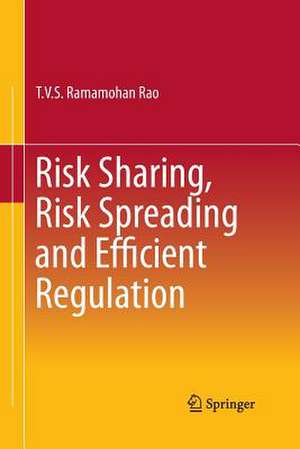Risk Sharing, Risk Spreading and Efficient Regulation
Autor T.V.S. Ramamohan Raoen Limba Engleză Paperback – 23 aug 2016
Each of the chapters is structured using a principal agent model, and all chapters incorporate adverse selection (and exogenous randomness) as a result of information asymmetry, as well as moral hazard (and endogenous randomness) due to the self-interest-seeking behavior on the part of the participants.
| Toate formatele și edițiile | Preț | Express |
|---|---|---|
| Paperback (1) | 389.11 lei 6-8 săpt. | |
| Springer India – 23 aug 2016 | 389.11 lei 6-8 săpt. | |
| Hardback (1) | 396.40 lei 6-8 săpt. | |
| Springer India – 4 noi 2015 | 396.40 lei 6-8 săpt. |
Preț: 389.11 lei
Nou
Puncte Express: 584
Preț estimativ în valută:
74.46€ • 77.64$ • 61.89£
74.46€ • 77.64$ • 61.89£
Carte tipărită la comandă
Livrare economică 21 martie-04 aprilie
Preluare comenzi: 021 569.72.76
Specificații
ISBN-13: 9788132234463
ISBN-10: 8132234464
Pagini: 293
Ilustrații: XVII, 293 p.
Dimensiuni: 155 x 235 mm
Greutate: 0.44 kg
Ediția:Softcover reprint of the original 1st ed. 2016
Editura: Springer India
Colecția Springer
Locul publicării:New Delhi, India
ISBN-10: 8132234464
Pagini: 293
Ilustrații: XVII, 293 p.
Dimensiuni: 155 x 235 mm
Greutate: 0.44 kg
Ediția:Softcover reprint of the original 1st ed. 2016
Editura: Springer India
Colecția Springer
Locul publicării:New Delhi, India
Cuprins
1. Introduction.- 2. Conferences and Publications.- 3. Knowledge Intensity and Risk sharing.- 4. Information Asymmetry.- 5. Technology Transfer.- 6. Equity Participation.- 7. Cost Sharing.- 8. Warranties and Risk Sharing.- 9. Accident and Health Insurance.- 10. Securitization and Volatility.- 11. Foreign Institutional Investors and Regulatory Diligence.- 12. Financial Crisis and Regulatory Policy.- 13. Estimating the Parameters.- 14. Conclusion.
Notă biografică
Dr. Rao has a PhD from the University of Southern California, Los Angeles. He was a professor at the Indian Institute of Technology, Kanpur from 1978 until 2007. He also taught at the University of Southern California, California State University at Long Beach and at the Kansas State University, Manhattan. He was a visiting professor at the University of Pennsylvania, Philadelphia and the University of Alberta, Edmonton. Dr. Rao published extensively in the areas of microeconomic theory, industrial organization and econometrics.
Textul de pe ultima copertă
The book provides an integrated approach to risk sharing, risk spreading and efficient regulation through principal agent models. It emphasizes the role of information asymmetry and risk sharing in contracts as an alternative to transaction cost considerations. It examines how contracting, as an institutional mechanism to conduct transactions, spreads risks while attempting consolidation. It further highlights the shifting emphasis in contracts from Coasian transaction cost saving to risk sharing and shows how it creates difficulties associated with risk spreading, and emphasizes the need for efficient regulation of contracts at various levels.
Each of the chapters is structured using a principal agent model, and all chapters incorporate adverse selection (and exogenous randomness) as a result of information asymmetry, as well as moral hazard (and endogenous randomness) due to the self-interest-seeking behavior on the part of the participants.
Each of the chapters is structured using a principal agent model, and all chapters incorporate adverse selection (and exogenous randomness) as a result of information asymmetry, as well as moral hazard (and endogenous randomness) due to the self-interest-seeking behavior on the part of the participants.
Caracteristici
Emphasizes the need for contract design to encompass risk spreading as well as efficient regulation in addition to risk sharing Provides an analysis of information dissemination including technology transfer, cost sharing, warranties and insurance to signal the quality of products, securitization and other financial instruments resulting in financial crises, and ex ante as well as ex post regulation of contracts Demonstrates the possibility that inefficiencies in contracts may far exceed those resulting from free market operation







